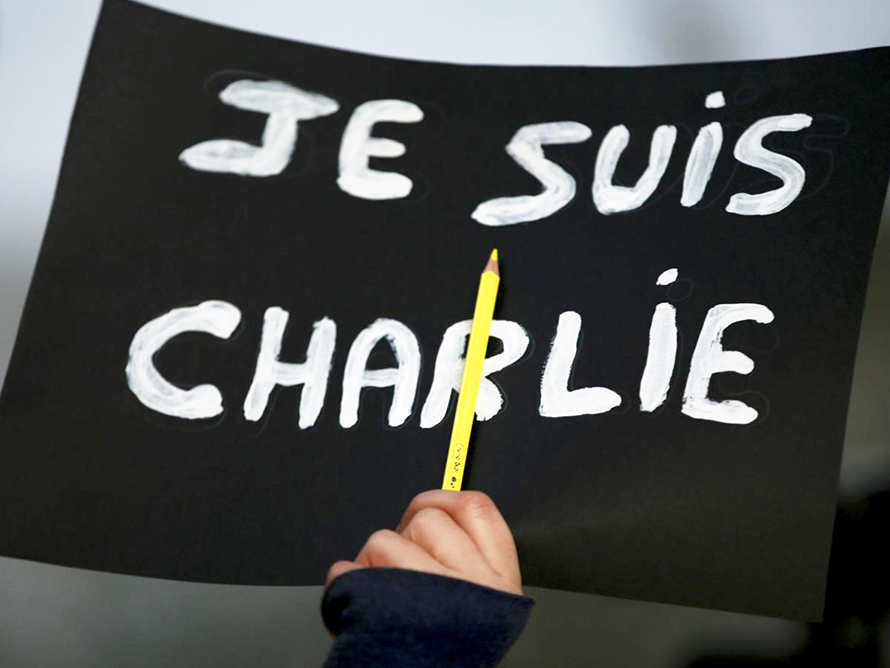Is the freedom to offend essential? In France, the fifth anniversary of its deadliest terror attack sees renewed tensions over questions of blasphemy, terrorism and religious tolerance. Five years ago today, gunfire drowned out the music in a Paris concert hall. In the middle of a performance by the Eagles of Death Metal, three men carrying machine guns stormed into the Bataclan theatre and opened fire. Ninety people were killed – but that was only part of the horror. Five other attacks were carried out in Paris, including a suicide bombing outside the Stade de France. In total, there were 130 deaths. ISIS claimed responsibility for the attacks, capping a year of extremist violence that began that January, with the deadly attack on the French satirical magazine Charlie Hebdo. Twelve of the magazine’s staff were murdered for publishing cartoons mocking the Prophet Muhammad, whose depiction is forbidden in Islam. This year, in September, Charlie Hebdo republished those cartoons in a show of defiance as the trial of 14 people accused of planning that attack began. France has since faced further attacks, and has seen the revival of an argument about the freedom to offend religious sensibilities. In October, a schoolteacher, Samuel Paty, was murdered by an Islamist terrorist. Paty had shown the cartoons to students in his class as part of a discussion of freedom of speech. Paying tribute to Paty, French President Emmanuel Macron reaffirmed his commitment to the French principle of Laïcité, and, notably, to the cartoons themselves, saying, “We will not disavow the cartoons, the drawings, even if others recoil.” Following this speech, there have been other attacks in France, including the murder of three people in a church in Nice. This latest cycle of outrage echoes not just the 2015 Charlie Hebdo attacks, but the 2005 protests in response to Danish cartoons of the Prophet Muhammad; and the 1988 fatwa against Salman Rushdie. For some, like Macron, no matter how much offence such publications cause, nor how predictable the outcome, the priority is to defend the right to be offensive. To such people, for the country of Voltaire to disavow anti-clerical images would be to surrender to the assassin’s vetoAn official way of blocking or forbidding something.. Others take a different view of free speech and offence. French law, as in many other European countries, prohibits hate speech and “apology for terrorism”. Macron has recently announced plans for the state to regulate the training of foreign Imams. For his critics, this is a sign of hypocrisy about permissible speech. Some argue that if such cartoons are identified with French secular values – not simply tolerated, but celebrated – it is harder for those who feel insulted by them to feel included in the republic. Muslims, they say, are being asked to tolerate offence, without themselves being shown much tolerance. The verdict for those accused of planning the Charlie Hebdo attacks was meant to be due today. It has now been postponed because of Covid-19. So, is the freedom to offend essential? No offence It is essential, say some. To police offensive speech is to allow those who claim offence the power of censorship. As John Stuart Mill once argued, any strong enough refutation of our beliefs is liable to offend us, and a healthy culture cannot allow our beliefs to go untested. Not so, say others. Certain kinds of offensive speech deprive the offended of their dignity. Hate speech, for example, is widely considered unacceptable. Arguments that certain people don’t belong in the country, or are inferior, create an atmosphere where they cannot express themselves as equals. In such a case, offensive speech becomes a kind of censorship of its own. Keywordsveto - An official way of blocking or forbidding something.
Is the freedom to offend essential? In France, the fifth anniversary of its deadliest terror attack sees renewed tensions over questions of blasphemy, terrorism and religious tolerance.
No offence
In the shadow of terror: France still on edge

Glossary
veto - An official way of blocking or forbidding something.
